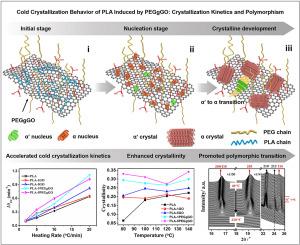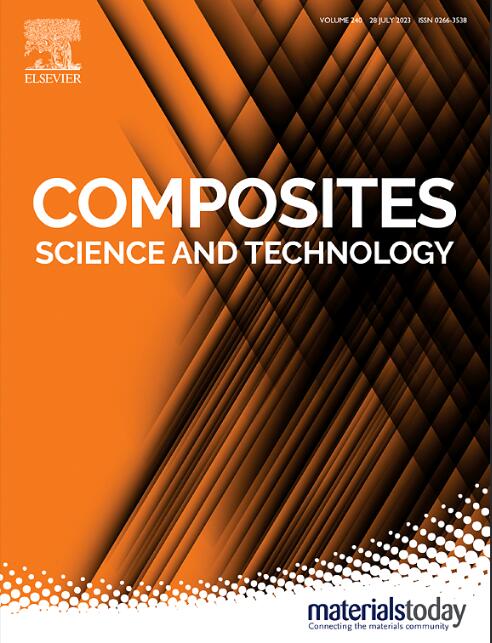Cold crystallization behavior of poly(lactic acid) induced by poly(ethylene glycol)-grafted graphene oxide: Crystallization kinetics and polymorphism
IF 8.3
1区 材料科学
Q1 MATERIALS SCIENCE, COMPOSITES
引用次数: 0
Abstract
Cold crystallization between the glass transition and melt temperature is of particular significance for crystalline regulation due to the slow crystallization rate of poly(lactic acid) (PLA). Incorporation of nucleation agents can promote PLA crystallization by reducing the nucleation activation energy and offering nucleation sites. Herein, we investigated the cold crystallization behavior of PLA induced by poly(ethylene glycol)-grafted graphene oxide (PEGgGO) which was synthesized and identified as a powerful nucleation agent for melt crystallization. The obtained results showed that PEGgGO not only accelerated the cold crystallization kinetics of PLA, but also promoted the polymorphic transition kinetics during the heating process. The half crystallization time of PLA induced by PEGgGO was shortened by 51 % and the final crystallinity increased by 57 % compared to that induced by GO alone at the same loading of 0.5 wt%. In addition, relative to GO, PEGgGO enabled the α′-to-α phase transition kinetics of PLA by a reduced transition temperature range of 26 % due to its excellent nucleation ability even at cold crystallization. The flexible PEG chains on GO facilitated crystalline regulation of PLA owing to the improved chain mobility. This work provides a broader framework for fashioning semicrystalline PLA products with enhanced crystallinity and refined crystal structure towards prospective applications.

聚(乙二醇)接枝氧化石墨烯诱导的聚(乳酸)冷结晶行为:结晶动力学和多态性
由于聚乳酸(PLA)的结晶速度较慢,玻璃转化温度和熔融温度之间的低温结晶对结晶调节具有特别重要的意义。掺入成核剂可降低成核活化能并提供成核位点,从而促进聚乳酸的结晶。在此,我们研究了聚乙二醇接枝氧化石墨烯(PEGgGO)诱导聚乳酸冷结晶的行为。研究结果表明,PEGgGO 不仅加速了聚乳酸的冷结晶动力学,还促进了加热过程中的多晶型转变动力学。在相同的负载量(0.5 wt%)下,PEGgGO 诱导的聚乳酸半结晶时间比 GO 单独诱导的结晶时间缩短了 51%,最终结晶度提高了 57%。此外,与 GO 相比,PEGgGO 即使在低温结晶时也具有出色的成核能力,因此能使聚乳酸的 α′ 至 α 相转变动力学温度范围降低 26%。由于聚乳酸链的流动性提高,GO 上的柔性 PEG 链有利于聚乳酸的结晶调节。这项工作提供了一个更广泛的框架,可用于制造结晶度更高和晶体结构更精细的半结晶聚乳酸产品,以实现未来的应用。
本文章由计算机程序翻译,如有差异,请以英文原文为准。
求助全文
约1分钟内获得全文
求助全文
来源期刊

Composites Science and Technology
工程技术-材料科学:复合
CiteScore
16.20
自引率
9.90%
发文量
611
审稿时长
33 days
期刊介绍:
Composites Science and Technology publishes refereed original articles on the fundamental and applied science of engineering composites. The focus of this journal is on polymeric matrix composites with reinforcements/fillers ranging from nano- to macro-scale. CSTE encourages manuscripts reporting unique, innovative contributions to the physics, chemistry, materials science and applied mechanics aspects of advanced composites.
Besides traditional fiber reinforced composites, novel composites with significant potential for engineering applications are encouraged.
 求助内容:
求助内容: 应助结果提醒方式:
应助结果提醒方式:


